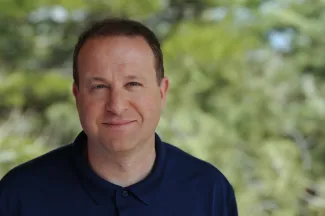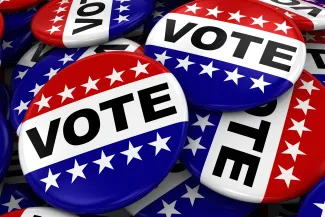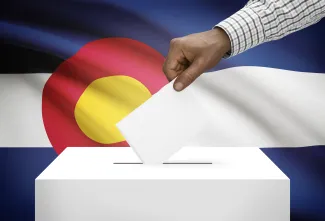
Polis signs bill that will delay implementation of proposed Colorado election overhaul
© Baris-Ozer - iStock-1420488382
(Colorado Newsline) Defying pressure from election reform advocates backed by an influential Colorado megadonor, Governor Jared Polis Thursday signed into law a bill that would delay the implementation of a sweeping election overhaul poised to make the 2024 ballot.
But the governor and top lawmakers on both sides of the aisle pledged to promptly take up legislation fulfilling the intent of the measure, which proposes to abolish the party primary and assembly system and implement ranked choice voting for state and federal offices, if the initiative wins approval from Colorado voters.

The nonprofit Unite America backed a successful effort to establish such a system in Alaska in 2020 and is pushing its model in Colorado and at least four other states in 2024. The group is co-chaired by Kent Thiry, former CEO of Denver-based dialysis services company DaVita, who has previously bankrolled successful efforts to open Colorado’s primaries and establish independent redistricting commissions.
“We’re disappointed with today’s outcome, but we know whose side voters are on,” said Curtis Hubbard, a spokesperson for Colorado Voters First, the campaign supporting the ballot measure. “We will continue fighting — in the courts, across the state, and at the ballot box — for the rights of any voter to vote in any election and for the citizens initiative process.”
Opponents of the proposal said that Polis and other state leaders recognized that implementing the system is “virtually impossible as proposed.”
“The governor’s signature assures that Colorado voters will be able to test the viability of the ballot proposals before they would be implemented statewide and only if all the requirements are in place,” said Ellen Dumm, a spokesperson for the opponents.
Senate Bill 24-210, passed by large bipartisan majorities in the General Assembly last month, included a variety of reforms to election security and administration broadly supported by voting rights groups and local elections officials. But it also contained a last-minute amendment introduced on the House floor by Democratic state Representative Emily Sirota of Denver, enacting a series of hurdles that must be cleared before the new election system could go into effect.

© iStock
The Unite America model, which proponents champion as a cure for “political extremism and dysfunction,” would abolish partisan primaries in favor of an “all-candidate primary,” from which the top four vote-getters would advance. The four-candidate general election would be decided by ranked choice voting, also known as instant-runoff voting, a method in which voters rank as many or as few of the four candidates as they wish; candidates with the fewest first-place votes are eliminated until one candidate receives a majority. The system would apply to elections for U.S. House, U.S. Senate, governor and other statewide executive offices, and the state Legislature.
Under SB-210, the proposed system could not take effect until a number of Colorado local governments meeting various population and demographic criteria have implemented ranked choice voting, and the Colorado secretary of state has completed an analysis of its implementation and impacts on “historically under-represented communities.”
News of the amendment’s implications was broken last week by The Colorado Sun, which reported that the initiative’s proponents were unaware of the roadblocks until contacted for the story. Unite America and a dozen groups that advocate for voting rights and election reform promptly urged Polis to veto SB-210 and what they called its “egregious abuse of power.”
The Colorado County Clerks Association, which represents local elections officials from across the state and supported “guardrails” on a ranked choice voting rollout like those added to SB-210, had urged Polis to sign the bill. A coalition of left-leaning interest groups also lobbied against a veto, writing in a letter that Unite America’s proposal would enact “expensive, untested, and inaccessible processes that hurt voters and disproportionately benefit money-backed candidates.”
Implementation by 2028?
In a statement issued Thursday, Polis said that the provisions in the bill relating to ranked choice voting “were included at the last moment and without proper stakeholding.”
“If voters approve a ballot measure pertaining to those issues this November, the language in the bill will not be the starting point for implementation and it will be essential to reconcile the bill with the measure and to take prompt and good faith actions to successfully implement the will of the voters,” Polis said.
Polis’ statement was quickly echoed by top Democratic and Republican lawmakers, all of whom issued statements expressing nearly identical sentiments implying a legislative fix if Unite America’s ballot measure passes.
Should voters adopt a ballot measure on multi-party primaries and ranked choice voting, notwithstanding language added to SB-210, we would always work in good faith to uphold the will and intent of the voters on a practicable timeline.
– Senate President Steve Fenberg of Boulder and House Speaker Julie McCluskie
The “problematic language” in SB-210, said GOP Senate Minority Leader Paul Lundeen of Colorado Springs, “must not serve as a starting point for any conversation about what the election process in Colorado looks like.”

“Should voters adopt a ballot measure on multi-party primaries and ranked choice voting, notwithstanding language added to SB-210, we would always work in good faith to uphold the will and intent of the voters on a practicable timeline, while taking into account the very real and legitimate implementation issues identified by our local election administrators,” Democratic Senate President Steve Fenberg of Boulder and House Speaker Julie McCluskie said in a statement.
“If a ballot initiative passes in the 2024 election related to ranked choice voting, I am committed to working with all sides on a process to find agreement on implementation of the initiative in a way that respects voter intent and the needs of our county clerks,” said House Minority Leader Rose Pugliese, a Colorado Springs Republican.
The ballot measure proposed by Thiry and his allies — several different versions of which are still pending — proposed the implementation of the new system in time for the 2026 election, when Colorado will elect a new governor to succeed the term-limited Polis. Some critics have speculated that a motive behind the reforms is to make it easier for Thiry — who publicly mulled a run for governor as a Republican in 2017, then formally switched his registration to unaffiliated later that year — to mount a gubernatorial bid.
Polis said that he would work to implement an approved initiative “as soon as practicable and certainly no later than the 2028 election cycle” — a timeline also endorsed by the Colorado County Clerks Association in a separate statement Thursday.
“The clerks remain committed to bringing forth our election expertise to any conversation that would reform our nationally recognized election model,” the organization’s statement read. “If all system requirements are in place and voters pass the 2024 citizen ballot initiative regarding (ranked choice voting) and all-candidate primaries, implementation of the initiative duly passed by the people of Colorado can be done by 2028.”
Colorado Newsline is part of States Newsroom, a nonprofit news network supported by grants and a coalition of donors as a 501c(3) public charity. Colorado Newsline maintains editorial independence. Contact Editor Quentin Young for questions: info@coloradonewsline.com. Follow Colorado Newsline on Facebook and Twitter.

















